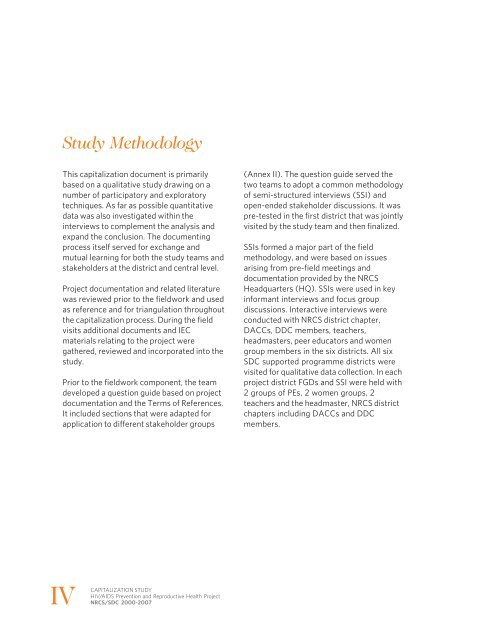HIV/AIDS Prevention & Reproductive Health Project
HIV/AIDS Prevention & Reproductive Health Project
HIV/AIDS Prevention & Reproductive Health Project
You also want an ePaper? Increase the reach of your titles
YUMPU automatically turns print PDFs into web optimized ePapers that Google loves.
Study Methodology<br />
This capitalization document is primarily<br />
based on a qualitative study drawing on a<br />
number of participatory and exploratory<br />
techniques. As far as possible quantitative<br />
data was also investigated within the<br />
interviews to complement the analysis and<br />
expand the conclusion. The documenting<br />
process itself served for exchange and<br />
mutual learning for both the study teams and<br />
stakeholders at the district and central level.<br />
<strong>Project</strong> documentation and related literature<br />
was reviewed prior to the fieldwork and used<br />
as reference and for triangulation throughout<br />
the capitalization process. During the field<br />
visits additional documents and IEC<br />
materials relating to the project were<br />
gathered, reviewed and incorporated into the<br />
study.<br />
Prior to the fieldwork component, the team<br />
developed a question guide based on project<br />
documentation and the Terms of References.<br />
It included sections that were adapted for<br />
application to different stakeholder groups<br />
(Annex II). The question guide served the<br />
two teams to adopt a common methodology<br />
of semi-structured interviews (SSI) and<br />
open-ended stakeholder discussions. It was<br />
pre-tested in the first district that was jointly<br />
visited by the study team and then finalized.<br />
SSIs formed a major part of the field<br />
methodology, and were based on issues<br />
arising from pre-field meetings and<br />
documentation provided by the NRCS<br />
Headquarters (HQ). SSIs were used in key<br />
informant interviews and focus group<br />
discussions. Interactive interviews were<br />
conducted with NRCS district chapter,<br />
DACCs, DDC members, teachers,<br />
headmasters, peer educators and women<br />
group members in the six districts. All six<br />
SDC supported programme districts were<br />
visited for qualitative data collection. In each<br />
project district FGDs and SSI were held with<br />
2 groups of PEs, 2 women groups, 2<br />
teachers and the headmaster, NRCS district<br />
chapters including DACCs and DDC<br />
members.<br />
IV<br />
CAPITALIZATION STUDY<br />
<strong>HIV</strong>/<strong>AIDS</strong> <strong>Prevention</strong> and <strong>Reproductive</strong> <strong>Health</strong> <strong>Project</strong><br />
NRCS/SDC 2000-2007

















